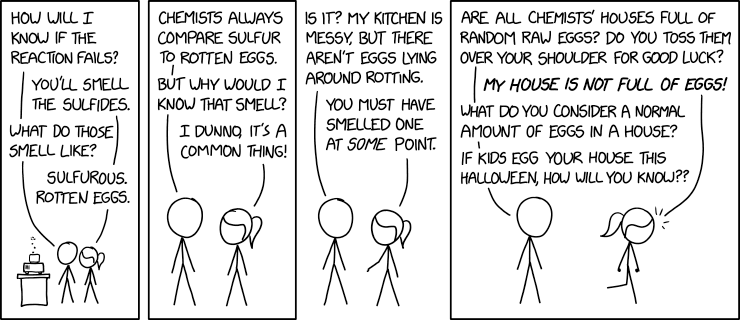Chemist Eggs

Chemists actually find it simpler to define a general odor of rotten eggs as a baseline, and the LACK of rotten eggs as a distinct smell.

Chemists actually find it simpler to define a general odor of rotten eggs as a baseline, and the LACK of rotten eggs as a distinct smell.
In this comic, Ponytail explains to Cueball that if he smells sulfides then the chemistry experiment on which they're working has failed. Ponytail then clarifies that sulfides smell like rotten eggs. The main and most distinct chemical rotten eggs emit is hydrogen sulfide, hence most people who smell them will link the chemical with "rotten egg smell".
Cueball replies, however, that he doesn't actually know what rotten eggs smell like, and it's odd that everyone uses that as a comparison. This is a result of changing times — decades ago, when the 'rotten eggs' descriptor became commonplace in chemistry education at high schools and universities, rotten eggs were indeed common enough that cooks avoided adding eggs directly to other ingredients, lest the rotten egg, not detected until after it was too late, force the cook to discard everything and start over. Vastly improved farming, shipping, and marketing practices have made the rotten egg vanishingly rare, at least at supermarkets in the USA. Moreover, much greater recognition of the health hazards of hydrogen sulfide means that, due to various occupational safety precautions, opportunities for sniffing the gas have become scarce, and usually engender swift reactions such as building evacuation.
Thus, the comparison has outlived the circumstances that spawned it, and chemistry teachers parrot a line they learned as students, which is no longer relevant to the students' experience. Cueball then takes the disconnect between the trope and his experience and pushes it for all it's worth. This could be taken as symbolic of people who spot such discordances and blow them out of proportion to troll others, in which case, Cueball has most definitely succeeded, based on how Ponytail reacts — she is clenching her fists in anger as she leaves the conversation, presumably to avoid further irritation. (Perhaps she smells eggs often from the people in 382: Trebuchet!)
Some of Cueball's questions suggest that chemists use eggs in place of other items. For example, the superstitious may react to a spilling of salt by picking it up and throwing it over their left shoulder, ostensibly as an attempt to blind the Devil. Another relates to the upcoming night before Halloween event called "Mischief Night", where kids are known to throw eggs at houses. Cueball asks Ponytail how she will know if this has happened, as he thinks she keeps an unusually large number of eggs in her house.
Even though rotten eggs (and hydrogen sulfide in general) are much less common nowadays, many fuel gases are mixed with odorant compounds to signal that a leak is happening; even if the user might be unfamiliar with "rotten eggs" specifically, a large amount of unpleasant odor still works as an alarm that something bad is happening. People who use natural gas or propane stoves should be familiar with the similarly rotten smell of methanethiol, ethanethiol, and/or tert-butylthiol (the "-SH" thiol group is a common feature of many pungent odors, including garlic and skunk spray). Some mineral springs and other natural water sources also contain sulfides and have a strong sulfide odor and flavor; they are sometimes referred to as "sulfur springs".
The title text makes a joke about how often chemists use the comparison, saying that they use a rotten egg smell as the baseline and that a lack of the smell is a distinct one. Given the health hazards of hydrogen sulfide and the regulations now enforced in recognition of those hazards, the chemistry teacher probably doesn't often experience the smell either. Since hydrogen sulfide deadens the sense of smell, taking this smell as a 'baseline' is improbable and potentially dangerous, and it's unfortunate that the title text makes this suggestion.